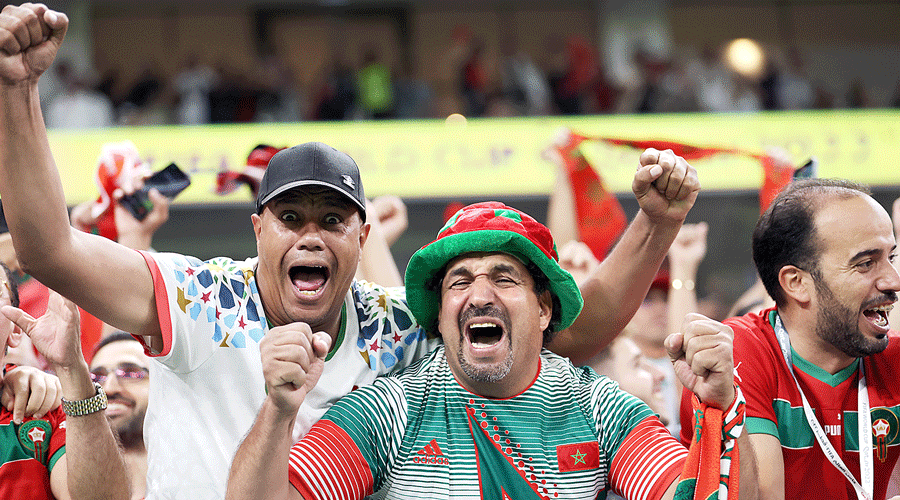Corbeil-Essonnes is a suburb in Paris where life is not easy. And Walid Regragui, the Morocco coach who was born there, knows what it takes to thrive in adversity.
The 47-year-old has done wonders with the Moroccan team becoming the first African nation to enter the World Cup semi-final. Probably, the daily struggle at Corbeil-Essonnes in his formative years gave him the strength to take on the world but Regragui would rather not dwell on it.
“I don’t want to talk about social exclusion, living in a difficult suburb (Corbeil-Essonnes). I was from a difficult neighbourhood and I had to fight more than other people. If it can help me, it would be great. It could make me hungrier,” he says.
Nobody gave Morocco a chance to qualify from Group F — comprising last edition’s runners-up Croatia, the No.2-ranked team Belgium, and Canada. But the Atlas Lions defied all odds and topped the group like they had done in 1986. Next, they knocked out heavyweights Spain and Portugal. Could France, the country which ruled them for years, be next to fall by the wayside on Wednesday?
Noted Nigerian journalist Kunle Solaja, who is covering World Cups since 1990, says Morocco have always been good; it’s just that the world has taken note of it now.
“They held Bulgaria 1-1 in the 1970 World Cup. They have a good football history,” Solaja says. “Unlike the Sub-Saharan African nations, where corrupt officials and administrators have ruined the game, Morocco have invested in youth and it’s paying off now.”
Regragui agrees that proper training at the grassroots has helped Moroccan football to grow.
In 2009, Mohammed VI Football Academy was started in Sale to reshape how football is played in Morocco. Players like Youssef En-Nesyri and Nayef Aguerd are products of that academy. “We are lucky enough to have Mohammed VI (The Moroccan king) who has invested heavily in football. We have great infrastructure now,” Regragui said. “The academy is part of this royal project. We needed to focus on training in Morocco. There are so many players who are products of this training system and it shows that we have made great progress.”
For all their growth, somewhere Morocco’s 1986 exploits — when they lost to Germany 1-0 in the Round of 16 — remain a reference point. “Yes we still take pride in that performance. Mexico was not just about Diego Maradona, it was also about us,” a Moroccan journalist who did not wish to be named due to contract obligations, said.
Reinforcing what the current success means for the team and the African continent, the journalist added: “What will it mean to you if India play in a World Cup semi-final? It’s the same for Morocco. A small nation with limited resources, but still we are alive in the World Cup.”
Regragui’s emphasis on change in mentality has also got to do a lot with the team’s unbelievable run. The coach has heavily impressed upon his players that they need to think about playing seven matches in Doha. “We’re not here to kid around or go through the motions. We are going to go deep,” he says. “We want to do this for Africa. We want to seize that chance. I don’t want to wait 40 years for an African team to be here at a news conference. I’m crazy, I’m a dreamer.”
Once a fan of Pep Guardiola, Regragui has debunked the Spaniard’s idea of football as he has realised the end result is very important.
Unlike other African teams who play more with heart and have flattered to deceive, Morocco have bucked the trend. “That’s because they have footballers who play in top European clubs. This bunch is confident and not scared of European teams,” journalist Solaja says.
At the pre-match news conference on Tuesday, France coach Didier Deschamps also said: “What they have achieved is fantastic for the continent.”
Around 20,000 fans are in Doha at this point in time rooting for the “fantastic” national team with several flights being organised from Casablanca and Rabat. “It shows the passion we have for football. Coming to Qatar is very expensive,” Regragui said.
The fans have become an integral part of this Morocco campaign with a cacophony of noises and whistles in the stands. They are so noisy that it gives the players a home-match feel.
Yassine Bounou, Regragui, Achraf Hakimi and others have thanked the spectators for their continued support. “Yes we all support Morocco. It’s not just because it’s an Arab team but because they are the underdogs of this World Cup,” Qatar’s Mohamad Al-Nayimi said, while Mamun Hussain, a fan from Bangladesh, said he was also rooting for the Atlas Lions.
“This Cup showcases our fans,” Regragui said. “Tomorrow, we should feel like we’re playing at home.”

